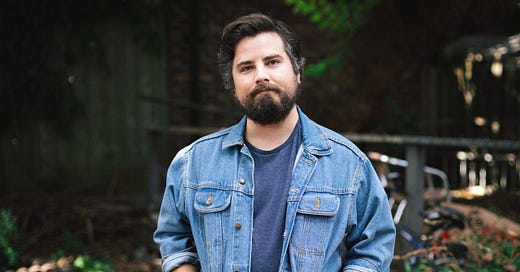Moves on marriage in Thailand, Namibia, India
Inconclusive elections in Europe put LGBT rights in peril
Some quick housekeeping. In my haste to send out a Friday’s newsletter, I included a link to a story I wrote for the Los Angeles Blade that wasn’t yet active. Here’s the corrected link to my explainer about what’s going on in Saskatchewan, Canada, where the Premier plans to override the Constitution’s Charter of Rights to enact a bill that will forcibly out trans students to their parents and require “parental consent” for them to socially transition in schools.
By the way, does anyone who went to journalism school know why it’s not considered standard practice to refer to him as “Saskatchewan Premier Scott Moe, who was twice charged and once convicted of drunk driving, and once killed a woman while driving dangerously in an incident he says he cannot recall”? It seems relevant! At least on a first mention.
Also for the Blade, I wrote a preview of debut author Curtis Campbell’s YA novel Dragging Mason County, about a group of teenage drag queens who meet resistance from their small town and from the local gay community when they try to launch Mason County’s first drag extravaganza. Dragging Mason County will be available starting tomorrow across North America wherever books are sold.
Around the World
Thailand’s Parliament has accepted three public bills that aim to legalize same-sex marriage, facilitate legal gender change, and decriminalize sex work. No word yet when they’ll be brought forward for debate.
Namibia’s main LGBT rights organization Equal Namibia has pledged to take the government to court over the latest bill to ban same-sex marriage and even advocacy for same-sex marriage, which sailed through Parliament last week and awaits the president’s signature. The group describes the bill as unconstitutional and clearly against the spirit of the Supreme Court ruling in May that required the government to recognize foreign same-sex marriages for immigration purposes.
As I mentioned last week, over the weekend, three more of Japan’s prefectures began offering same-sex partnership certificates: Kagawa, Shimane, and Tottori. They bring the total to 17 with active partnerships and 2 more to begin in the coming months, out of 47.
Some MPs in Italy are trying to require the public broadcaster RAI to reinforce positive portrayals of the traditional family, part of a trend of Italy’s quasi-fascist right-wing government to ideologically purge government agencies.
Observers expect India’s Supreme Court to issue its ruling in the same-sex marriage case soon, as one of its justices will retire on Oct 20, just a few weeks from now.
Activists holding a “Freedoms March” in Beirut, Lebanon were violently attacked by mobs accusing them of promoting homosexuality, in what’s becoming a growing trend of violence against LGBT people in a place that used to be relatively tolerant.
Elections
Slovakia’s election was so far inconclusive – the anti-gay, pro-Russia populists SMER topped the polls with 22%, but not enough to form government on their own. They will have the first option to try to build a coalition, then Progressive Slovakia, which has supported LGBT rights and same-sex marriage and pulled 17% in the polls, will get a chance if SMER fails. In all likelihood, SMER will be able to build a coalition with the third place HLAS and the far-right SNS nationalists. Even if PS is able to form a government, it’s unlikely it would have enough coalition support to pass any major LGBT rights initiatives.
In Poland, the leader minor opposition Left party held a symbolic wedding to his partner to show off support for same-sex marriage. The larger opposition centre-left Civic party also held a massive rally in Warsaw over the weekend.
Spain’s right-wing parties failed to win enough votes in Parliament to form government on Friday, so the left-wing parties have an opportunity to form government again. The right-wing parties had pledged to repeal last year’s trans rights, gender ID, and conversion therapy ban law, as well as a number of other pro-LGBT rights legislation, so this gives these laws a reprieve for now. It’s possible the left-wing fails at forming a government and Spain heads to another election.
Ahead of an Oct 14 elections in New Zealand, the incumbent Labour Party has issued a “rainbow” platform that includes reforming adoption and family laws to better recognize same-sex parents, end the gay blood donation deferment policy, and ban unnecessary surgeries on intersex children. This may be academic, because polls indicate that conservative and nationalist parties are likely to win a coalition government.
Some politicians in Scotland are very alarmed by a rise in violent homophobia in the country and in political discourse.
Voters head to the ballot boxes in Manitoba, Canada, tomorrow, where the incumbent conservatives, who’ve run a campaign on outright racism and homophobia, are projected to lose badly. Their most recent ad even acknowledged that their own supporters feel ashamed for supporting them.
Meanwhile, in the States
US Senator Diane Feinstein’s death last Thursday means not only has the Senate lost a longtime champion of LGBT equality, but Democrats have temporarily lost majority control of the Judiciary Committee. There was speculation that Republicans wouldn’t allow Democrats to appoint a replacement, but senior Republican Senators are refuting that now. A tie on the committee would have put the brakes on any new Democrat-leaning judges being appointed to federal courts. In the meantime, California Governor Gavin Newsom has appointed Laphonza Butler, a Black lesbian, to take Fienstein’s seat. He has apparently made no condition that she not run in the election for the seat that will take place next November.
Meanwhile, California Republicans rejected efforts to strip opposition to abortion and same-sex marriage from the party platform at their convention over the weekend.




